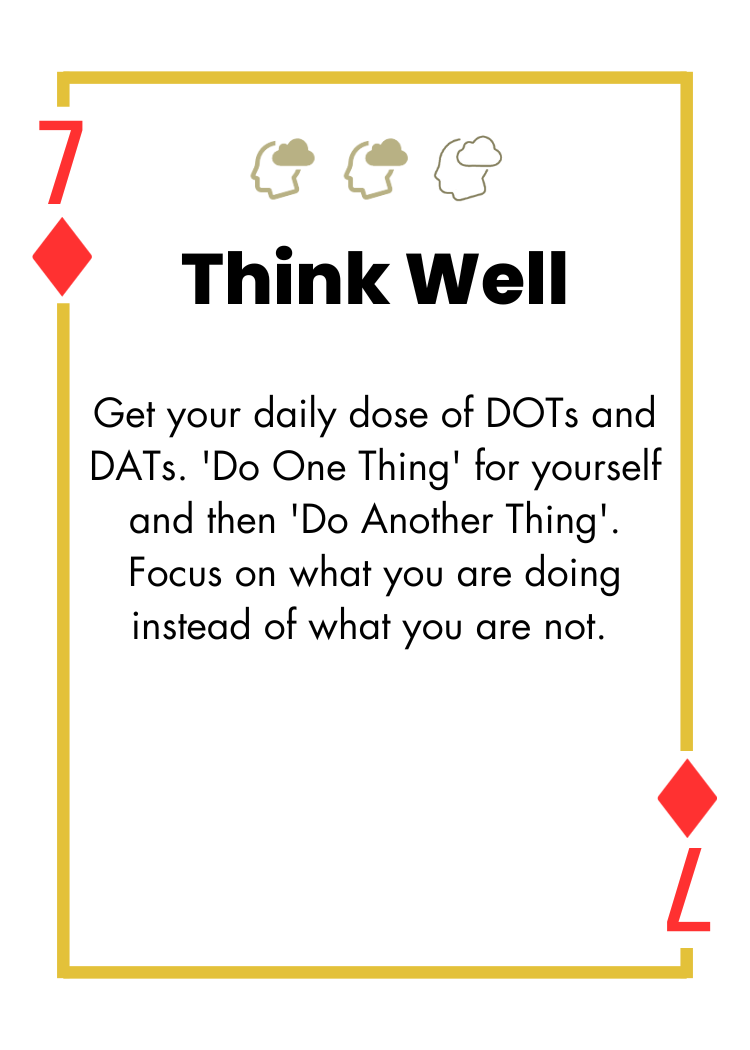7 of Diamonds - DOTs and DATs

Carrying out self-care involves taking purposeful actions to improve one’s own physical, mental, and emotional health (Martin and Delehanty 2024).
This Tip Is All About Self-Care.
We all get caught up doing jobs for others, for work or for our other responsibilities. Take some time out each day this week and be mindful of what you are doing for yourself – self-care is important for both mental and physical well-being.
Do One Thing for yourself (DOT) and then Do Another Thing (DAT).
Stuck for ideas of DOTs and DATs, our mental fitness experts have loads of examples locked and loaded.

DOTS and DATS stands for “Do One Thing and Do Another Thing.” Place a focus on what you are currently doing in the present rather than the things you aren’t doing. Imagine yourself riding a wave on a surfboard. Solely focused on balancing on the board and anticipating the next move you need to make in the current moment to ride the wave to shore safely. Keep your life in balance and stay in the moment.
Are you doing enough for yourself? Make sure to fill your emotional cup and place a strong focus on self-care.
Self-care routines are defined as participation in behaviours which maintain and promote physical and emotional well-being. These behaviours may include ones such as sleep, exercise, use of social support, emotion regulation strategies, and mindfulness practice (Myers et al., 2012).
Nursing is a demanding and emotionally taxing profession. Fatigue and compassion fatigue are issues which can affect a nurse’s professional performance and personal life. As a strategy to mitigate these effects, nurses are encouraged to eat a healthy diet, get exercise, get sufficient rest, maintain family and personal relationships, engage in adequate leisure and recreational activities, and pay attention to spiritual or religious needs (Martin and Delahanty 2024).
Research with university students shows psychological wellbeing increases with student engagement, persistence, and performance. Four practices, mindful acceptance, seeking social support, sleep hygiene, and food habits uniquely predicted well-being in university students (Moses et al., 2016).
A study by Myers et al. 2012, found self-care practices were found to be significantly related to perceived stress levels in a national sample of clinical psychology graduate students. Specifically, managing the areas of sleep hygiene, social support, the emotion regulation strategy of reappraisal and mindful acceptance were found to be significantly related to lower perceived stress levels in the students. The relationship between stress and self-care in psychology graduate students found in this study provides additional support for the importance of self-care as a training proficiency to decrease the negative impact of stress on both academic and clinical training.
Small changes CAN make a big difference – that’s what The 1% Club is all about.
A few starter self-care tips:
https://www.psychologytoday.com/us/blog/click-here-happiness/201812/self-care-12-ways-take-better-care-yourself
Martin, C., and Delehanty, M. (2024). Leadership coaching for team support: Prioritize self-care first!. Nursing Administration Quarterly, 48(2), 151-155.
Moses, J., Bradley, G. L., & O’Callaghan, F. V. (2016). When college students look after themselves: Self-care practices and well-being. Journal of student affairs research and practice, 53(3), 346-359.
Myers, S. B., Sweeney, A. C., Popick, V., Wesley, K., Bordfeld, A., & Fingerhut, R. (2012). Self-care practices and perceived stress levels among psychology graduate students. Training and Education in Professional Psychology, 6(1), 55.


 See Other Cards!
See Other Cards!